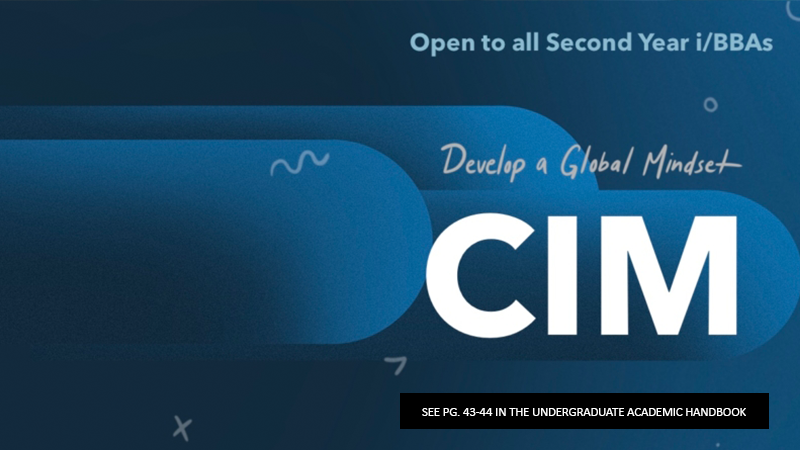 You may have decided on certain electives you want to take to satisfy a specialization but there is an opportunity to take a breadth of electives in your degree to get a well-rounded approach to business management. Consider these electives to complete your schedule!
You may have decided on certain electives you want to take to satisfy a specialization but there is an opportunity to take a breadth of electives in your degree to get a well-rounded approach to business management. Consider these electives to complete your schedule!
ACTG 3700 3.00 – Taxes and Decision-Making
This course will allow students in Entrepreneurship, Finance, Strategy, Marketing, and Organization Studies to appreciate the role of taxation for decision-making in their own fields. The conceptual framework developed in this course will allow students to analyze a broad set of personal and corporate tax problems in a systematic way. The business and personal tax implications of business decision-making are interdependent and must be considered simultaneously.
ECON 4210 3.00 – Macroeconomics and the Supply Side
Increasingly, governments are using fiscal, monetary and industrial policies to achieve major national goals. This course emphasizes economic theory and quantitative evidence to investigate the effects of such government policies on Canada’s international competitiveness. Attention is given to corporate strategies which respond to government initiatives and changes in the global marketplace.
FINE 4150 3.00 – Advanced Corporate Finance
Building on the concepts, models and decision situations presented in SB/FINE 2000 3.0 and SB/FINE 3100 3.0, the course exposes students to more advanced, complex and specialized decision situations in the areas of corporate investment, financing, financial planning and financial management. Applications and case analyses are important aspects of the course.
Prerequisite(s): FINE 3100 3.00
FINE 4400 3.00 – International Financial Management
The course provides students with the analytical tools and frameworks required to address financial decision making in the modern global firm. The emphasis of the course is on the financial management from the perspective of global financial manager. The main issues include currency risk management using derivative contracts, cross-border investment decisions, and financing decisions in the international financial markets. This course can also be used towards the Certificate in Managing in International Trade and Investment (CMITI).
Prerequisite(s): ECON 3510 3.00, IBUS 3100 3.00, or INTL 2200 3.00; and FINE 3100 3.00
FINE 4700 3.00 – Management of Canadian Financial Institutions
This course is designed to prepare managers for the newly developing financial services industry. The initial part of the course provides the conceptual background for a broad view of the management function in financial services. The second part of the course develops a generic set of tools for managing return and the various kinds of risk facing managers in this industry. The final part reviews recent adventures and misadventures of industry sectors including: financial regulators, central and chartered banking, trust companies, mortgage loan companies, credit unions and caisses populaires, investment bankers, property and casualty insurers, life insurers and investment funds. Near- and long-term market-size factors are considered including demographics, foreign competition in the Canadian market, as well as the opportunities and threats facing Canadian institutions that venture abroad.
IBUS 3200 3.00 – Managing International Business Activities
This course focuses on how to deal with the issues affecting the success of organizations operating internationally through exporting, importing, licensing or engaging in foreign direct investment. Role-playing, and development of an international business plan will be utilized in generating the skills and mind-set required for dealing with real-life international business situations. This course is required for the Schulich Certificate in Managing International Trade and Investment, but students do not have to pursue the Certificate to take the course.
Pre/corequisite(s): ECON 3510 3.00 or INTL 2200 3.00
IBUS 4200 3.00 – Integrative International Business Seminar
This course is the capstone for the Certificate in Managing International Trade and Investment. By exposure to senior executives operating in international business, who will be presenting seminars, and by actual visits to actual businesses, students will be able to see how real-life situations are dealt with, and what skills and mind-set are required to be successful in international business.
Notes: (1) Students in Year 3 must take this course as a co-requisite with IBUS 3200 3.00. (2) All pre-requisites are waived for students in Year 4 for Fall 2014.
Pre/Corequisite(s): IBUS 3200 3.00. Students do not have to pursue the Certificate to take the course. It may be taken as a stand alone elective.
IBUS 4500 3.00 – Managing Business in Developing Economies (NEW)
The course is designed to help students understand the opportunities and problems of managing business in developing economies. Through readings, cases and projects set in various geographical regions, students will learn how country- and organizational-level characteristics of various developing economies differentially influence market entry and related business functions in these economies. This course can also be used towards the Certificate in Managing in International Trade and Investment (CMITI).
MKTG 4100 3.00 – Strategic Marketing Communications
This course offers a focused approach to the formulation and implementation of an integrated communications strategy to meet particular marketing objectives. Topics of interest include advertising, sales, promotion, public relations, and social media communications, and their integration both online and offline. The approach to communications is cutting edge, multidisciplinary, integrative, practical, and applied. Teaching approaches are varied and include case analysis, discussion, and guest participants.
MKTG 4400 3.00 – International Marketing
This course satisfies two interrelated objectives: to improve the student’s marketing decision-making ability through the solution of complex multinational marketing problems; and to increase the student’s sensitivity to different cultural, socio-economic and legal environments encountered in the international marketplace. The course uses readings, cases and a group project. This course can also be used towards the Certificate in Managing in International Trade and Investment (CMITI).
OMIS 4300 3.00 – Service Operations Management
Service Operations is the study of the processing of customers and their information and possessions, by the most effective means. Financial services, hospitality, healthcare, manufacturers whether private or public sector need to improve service delivery. This course examines best practices in service design and emerging technology for their value in generating breakthroughs in creating superior customer value.
OMIS 4550 3.00 – Inventory Management
This course explores practical methods for planning and controlling inventories which can be understood and implemented by managers. Inventories are studied as a component of total business strategy. Specific topics include: statistical forecasting procedures and their evaluations, the nature of production and inventory systems, scheduling and planning of aggregate production, workforce and inventories and the design of operational decision systems for transmitting aggregate policy decisions consistently to the level of the individual stockkeeping unit.
ORGS 4400 3.00 – Managing Across Cultures
This course extends the basic frameworks and theories of Organization Behaviour into the context of international business, using fundamental OB concepts, including mind-sets and identities, interests and power, organizational roles and design, to enable students to work more effectively in terms of teams, leadership, motivation, negotiation, ethics, and organizational learning in cross-border business. This course can also be used towards the Certificate in Managing in International Trade and Investment (CMITI).
Note: Not open to iBBA students for degree credit
ORGS 4500 3.00 – Developing Management Skills
This course provides basic instruction in, and extensive opportunities for, the practice of a number of personal and interpersonal skills of value to improving managerial effectiveness, including: stress and time management, presentation and meeting leadership skills, conflict mangaement and negotiation skills, motivating, influencing others and effective listening. Classes are devoted primarily to experiential exercises; therefore, very little absenteeism is permitted. A high percentage of the grade is based on participation in class and the remainder is based on real-world applications of skills covered in this course.
SGMT 4200 3.00 – Mergers and Acquisitions
This course focuses on the major steps in the M&A process: (1) developing and executing an acquisition strategy; (2) preparing a valuation of the target and negotiating a deal; and (3) developing and implementing the post-merger integration plan. Also included are the roles and motivations of the major players in an M&A transaction, such as the executives and Boards of the acquirer and target, and deal advisors. The course format includes business cases, lectures, classroom discussion of deals currently in the news and class visits by M&A practitioners.
Prerequisite(s): SGMT 3000 3.00 or INTL 4400 3.00, and FINE 3100 3.00
SGMT 4750 3.00 – Strategy Execution (NEW)
This course addresses the managerial challenge of executing a firm’s strategy, by focusing on organizational elements that must be aligned to support a strategy as well as the tremendous difficulty of doing so. These elements include, but are not limited to, organizational structures and control mechanisms that match the given strategy as well as strategic leadership. Students learn and apply theory regarding strategy execution by analyzing implementation and performance in specific firms.
Pre-requisite(s): SGMT 3000 3.00 or INTL 4400 3.00





Leave A Comment